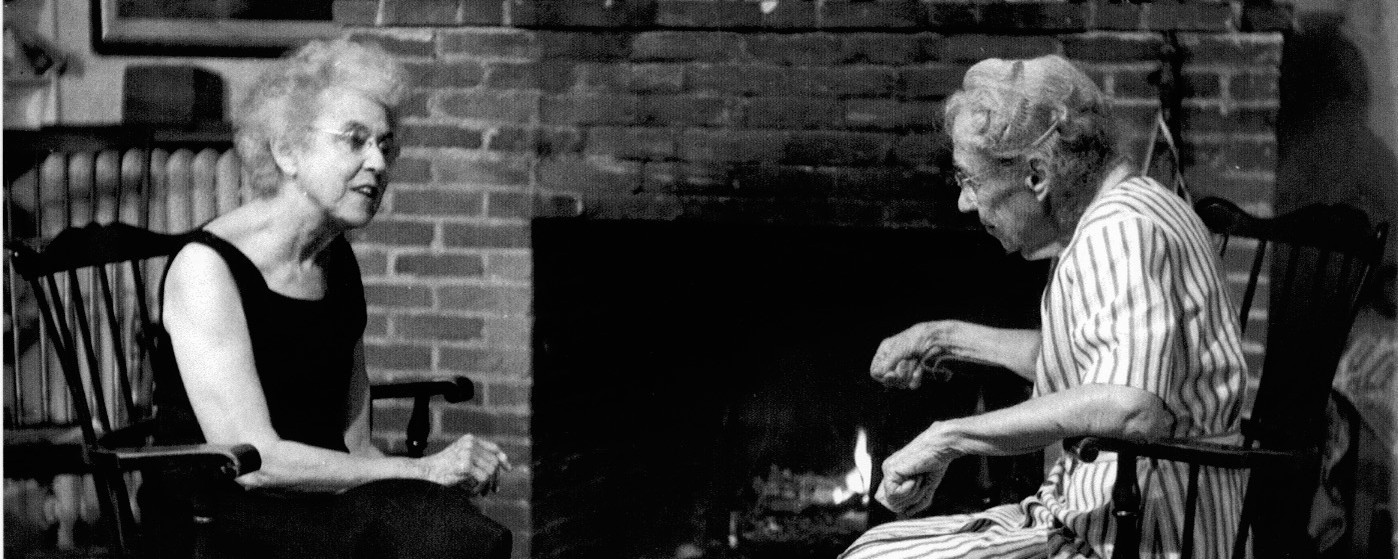Collecting Old Songs: Helen Hartness Flanders, 1930

Oral history transcriptions
Click a name below for more information. All transcripts are in PDF format.
Background information
In 1930, the Committee on Traditions and Ideals of the Vermont Commission on Country Life appointed Helen Hartness Flanders (1890-1972), of Springfield, Vermont, to spearhead a project to document the traditional music of Vermont. Mrs. Flanders, daughter of former Governor of Vermont James Hartness, and wife of Ralph Flanders, a leader in the Vermont machine-tool industry and later Republican Senator from Vermont from 1946-1959, was a trained musician, writer, and arts patron. With the assistance of George Brown of Boston, a member of the Springfield Symphony, Mrs. Flanders traveled throughout the state, sought out singers of old ballads, wrote down and, as technology developed from wax cylinder, to disk, to reel-to-reel magnetic tape, recorded traditional New England folksongs and ballads as sung by native Vermonters and other New Englanders.
In 1931, Flanders and Brown published Vermont Folk Songs and Ballads, a selection of 120 songs (lyrics and in many cases the musical notation) they had heard, written down, recorded, or received in the mail from the many “songsters” they met, interviewed, and listened to around the state. Writing in the Introduction to the volume, Hartness hinted at the richness of the material collected in just eight months of correspondence and one month of field work.
The full content of the summer’s collection lies in our files. It is of interest to the historian, the literary scholar, and to the general reader. . . . [H]ere may be a cross-section of what actually exists in Vermont. So little of the surface in this field was “scratched” that . . . the editor now feel confident there is a “songster” in nearly every community of the state—a person who knows these very human stories that were made into song too far back in the generations to have any known origin. Encouraged by what she had already collected, Hartness used the Introduction to the book to solicit additional material.
There is accumulating a real Archive of Vermont Folk-Songs which should be encompassing material from all corners of the state. Every contributor should write down each song in the exact words he remembers or finds them from some singer. In the process of distribution and ageing, many songs include unrecognizable words. These should be spelled just as they sound. Traditional words have some fullness of meaning, even when no dictionary has the form of their last appearance. . . . Many lines also do not rhyme. They should be recorded always as remembered whether rhyming or not. . . . Hunters, trappers, guides, and lumbermen have, in many cases, the very songs we are collecting. The man who troubles to write these out for us is contributing to the literary history of our state as well as sharing with other song-lovers something far more entertaining than is usually available today. After seeing this book, I am hoping to hear from many more people of the state and from out-of-state Vermonters who know any of these songs in this volume, but worded different or any of these tunes sung differently.
In May, 1941, Mrs. Flanders donated the collection, which had been housed in her own home in Springfield, Vermont, to Middlebury College, with the requirement that it be kept in a "fireproof environment" and that it should be used as a resource for academic and scholarly research. With the assistance of Marguerite Olney, who became curator of the collection at Middlebury, Flanders continued to add to the archive of field recordings until 1958. Over the course of thirty years, the collection grew to more than 4,800 field recordings and transcriptions of songs and ballads, supplemented by Mrs. Flanders’s personal research library containing several thousand books on American folksong, folklore, and balladry, dating from the late 18th through mid-20th centuries; over 600 broadsides; more than 200 songsters and hymnals; original 18th and 19th-century music manuscripts; an archive of transcriptions of songs and their multiple variants; and her personal and professional correspondence and business records.
The Flanders Ballad Collection, now housed at the Davis Family Library, remains one of Middlebury College’s greatest research collections, consulted frequently by folklorists and musicians locally, nationally, and internationally.
—Michael Sherman; Middlebury Library website
For further reading:
Grace M. Abbott, “She Collects Ballads,” Panorama, v. 3, no. 14 (Oct. 1, 1948): 4-5, 15.
Helen Hartness Flanders and George Brown, eds., Vermont Folk-Songs and Ballads. (Brattleboro: Stephen Daye Press, 1931).
Helen Hartness Flanders Ballad Collection Web site, Middlebury College Library. http://www.middlebury.edu/academics/lib/libcollections/collections/special/flanders
Nancy-Jean Ballard Seigel, “Granny Was a Songcatcher: Researching the Life and Work of Helen Hartness Flanders.” Audio tape, M-345 (2002), Vermont Historical Society library.
Citation for this page
Woodsmoke Productions and Vermont Historical Society, “Collecting Old Songs: Helen Hartness Flanders, 1930,” The Green Mountain Chronicles radio broadcast and background information, original broadcast 1988-89. https://vermonthistory.org/collecting-old-songs-helen-hartness-flanders-1930